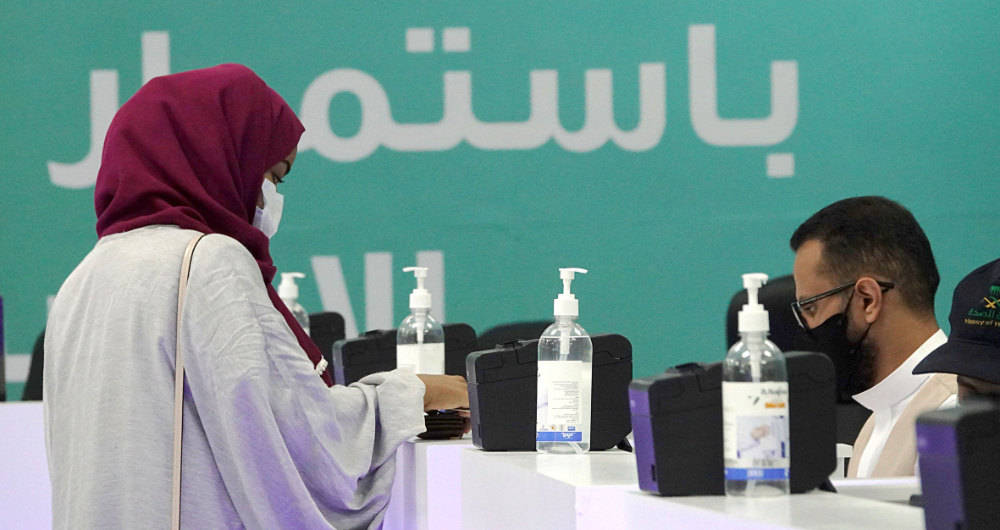JEDDAH: Equipped with trained staff members and the capacity to handle thousands of coronavirus vaccine recipients at a time, Saudi Arabia’s vaccine centers continue to provide their services for all of the Kingdom’s residents with ease.
With the launch of the largest nationwide vaccination campaign on Dec. 18, the first center opened in Riyadh and the second at Jeddah’s King Abdulaziz International Airport South Terminal opened its doors less than a week later. Arab News visited the Jeddah site to learn about the center’s work.
Dr. Mohammed Felemban, medical director at the health surveillance center at King Abdulaziz International Airport, said a large number of vaccination spots have been set up to reach as many people as possible.
“The first vaccination site was launched in Jeddah at King Abdulaziz International Airport South Terminal, with unlimited support from the leadership,” Felemban told Arab News. “Almost 83 vaccination points have been placed so far to ensure that all vaccines reach the largest possible groups.”
He added that the number of clinics will increase to over 450.
Upon arrival, recipients who have registered for the vaccine through the ministry’s Sehaty app will go through a number of steps.
They will pass through the entry point, where there will be a visual triage to check their temperatures and a registration site to confirm their information. Then there is a short waiting period before they are guided to their assigned clinic. After receiving the vaccine, recipients will head to a recovery zone to wait for 15 minutes before being discharged.
Trained medical staff dotting the center’s clinics are now handling those aged over 65, healthcare workers and individuals with chronic diseases — the groups targeted in the first phase of the vaccine rollout.

Saudi Arabia’s vaccine centers continue to provide their services for all of the Kingdom’s residents with ease.. (AN Photo/Huda Bashatah))
Dr. Ahmed Hawsawi, clinical program director at the center, explained the training that healthcare workers have received to handle the vaccine.
“All health professionals engaging in this job have been through intensive training. We can call it technical training that covers the vaccine itself and all the interactions with the vaccine in terms of the efficacy, side effects and all the tactics of the preparation, and so on,” Hawsawi told Arab News.
The other side of the technical training includes injection training, which teaches the use of needles and appropriate injection sites.
“All of the staff have been selected well in terms of their clinical experience and the competency needed for the project,” he said.
Staff have also undergone soft skills training, covering communication and assessment skills that help in learning patients’ medical history and responding to queries.
Hawsawi added: “This education is not only for giving the first dose. The center’s staff have ongoing support. There’s an assigned member of the team who is responsible for making sure that training is ongoing, and who continues the momentum of teaching, developing and even answering and coaching staff on anything that is needed during their service in the centers. It’s a holistic training.”
The training also covers the relationships between different teams within the center in an interdisciplinary fashion. “We have an admin team, customer service team as well as an information desk team. They all work together to start the service.”
Waleed Mutter, CEO of STC Specialized, received the vaccine on Monday. He registered as soon as he heard the news of the rollout, and like many in the Kingdom’s Western Region, he waited his turn until he received the call to attend the center, just a few days after its opening.
“When the vaccine was made available, I registered,” he told Arab News. “I have full trust in our government that they will not import anything that isn’t good for us. For this reason, I was one of the first people to register on the first day.”
HIGHLIGHTS
• Upon arrival, recipients who have registered for the vaccine through the ministry’s Sehaty app will go through a number of steps.
• They will pass through the entry point, where there will be a visual triage to check their temperatures and a registration site to confirm their information.
• Then there is a short waiting period before they are guided to their assigned clinic. After receiving the vaccine, recipients will head to a recovery zone to wait for 15 minutes before being discharged.
He added: “When I registered, everyone around me asked why did I do this? They said it was better to wait. I didn’t listen to them and I came to get vaccinated with full trust that it is good and has no consequences. As far as I’m concerned, this worry has occurred with every vaccine created.”
Mutter applauded the center for their well-organized services and responsive staff. “The center is very organized. It didn’t even take five minutes for me to reach the vaccination site. The team here is very cooperative and friendly, with great reception. I took the vaccine on my left arm and they told me to wait for 15 minutes to monitor me, because in the first 15 minutes after vaccination there might be nausea and such.”
An Indian business development manager at Zahid Travel, Shakeel Sultan, shared the same sentiment and was happy with the center’s arrangement throughout all its courses.
“I have taken my COVID-19 shot and I am grateful for this arrangement. It’s excellent. I could see everything organized and on time. The hygiene, the arrangements, the reception, the parking; everything is perfect. I recommend people of my community and all fellow expatriates to avoid listening to the rumors. Everything is fine. Go ahead and save yourselves,” he said.































